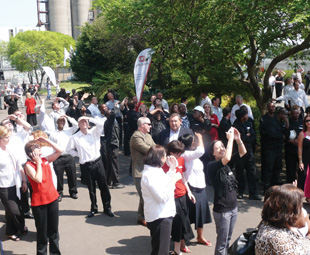UD Trucks: challenges ahead

It takes more than a corporate name change to maintain a dominant role in the sub-Saharan truck market. UD Trucks Southern Africa, formerly Nissan Diesel, plans to double its product range to counter the Asian challenge but how it will address the price issue is another matter. UDO RYPSTRA reports.
Johan Richards will probably never forget Thursday, 8 September, when about 500 truck assembly workers and admin staff downed tools at his factory in Rosslyn, Pretoria. This time around, it was not for higher wages or in sympathy with other motor industry workers, who had gone on strike and brought work at rival South African assembly plants to a standstill.
But in this case, Richards, chief executive officer, had requested, if not ordered them to do so to mark the name change of Nissan Diesel South Africa to UD Trucks Southern Africa. South Africa is the last of Japan’s UD Trucks Corporation’s foreign subsidiaries to do so.
For Richards, it was a double celebration, because it was his birthday as well.
To mark the name change, four parabats brandishing new UD flags and with smoke trailing from their boots, jumped plane in Tshwanean airspace. With precision planning, they touched down in the driveway leading up to UD Trucks’ headquarters, which now also featured new corporate logos to which an electrician, carefully balancing on a very tall ladder, had actually just made final adjustments.
 They landed in front of the festive crowd, narrowly missing the SA Breweries depot with towering silos next door and a line-up of factory-new UD trucks
They landed in front of the festive crowd, narrowly missing the SA Breweries depot with towering silos next door and a line-up of factory-new UD trucks
To mark his birthday, Richards was presented with a cake in the shape of a UD truck.
And then it was back to work, striving towards the objectives that Richards and his top executives have set themselves under the increased responsibility handed down by the Japanese mother company.
They had referred to it in their speeches earlier: to assemble trucks in SA and market and distribute them in every sub-Saharan country possible. Or, as GM corporate planning Rory Schultz had put it during a slide presentation: to try to make the UD Trucks corporate logo as familiar in the region as that of Coca-Cola’s.
He projected both logos onto a presentation screen after a slide, which provided a definition of the word “brand”. It said: “A company with a price advantage can be undercut or matched; a company with some performance advantage can be outflanked; but a company’s brand can never be copied, and you can ask a premium for the brand!“
Will this approach work? So far, the going has been more than good. With about 50 years of unbroken service under the old name, Nissan Diesel built up and enjoyed an excellent reputation in SA. It has been among the first local assemblers or manufacturers to adapt to local market conditions. Under Richards, it has been able to provide trucks, and even truck-bus chassis, to supply specific market niches, including rural library, medical depot, and multi-modal configurations with helicopter pads and rail-track gear, not forgetting armoured vehicles – all ex-factory. And it was the first company to teach how to look beyond the purchase price of a vehicle, emphasising the importance of truck life cycle costs. And back-up support.
Since then, it has been extending its dealer network base in sub-Saharan Africa, enabling it to become the country’s top truck exporter, boasting a 26.8% market share at the end of August.
UD Trucks Southern Africa has entered the picture with more than 50 dealers and service agents in Southern Africa. It has dealers in Angola, Botswana, Lesotho, Madagascar, Malawi, Mauritius, Mozambique, Namibia, Seychelles, Swaziland, Zambia and Zimbabwe. Three new dealerships are set to open in Lagos (Nigeria), Durban and Lichtenburg. The current service dealer in Bethlehem will upgrade to become a full dealership, and two new service branches are opening in Lephalale and Musina. In addition, the UD Trucks East London dealership will soon move into upgraded facilities.
“As we are actively developing and strengthening our footprint across the region, we believe the quality of our dealerships and the levels of sustainable support are vital to our success,” said Richards. “We aim to, in effect, mirror the activities and services we provide to local South African dealerships, to efficiently support our dealers and customers in sub-Saharan Africa”.
The challenge to increase its market share in sub-Saharan Africa is a major one and one that faces every truck assembler in SA and may be bigger than anticipated. As Richards and Schulz spoke, the Financial Times in London and FleetOwner in the USA carried major stories on their websites of the findings of a study by AlixPartners LLP, a respected international research and consultancy group.
 The stories stated that Chinese manufacturers were selling trucks into Asia and Africa at prices half the price of American trucks. It warned that OEMs and their suppliers should focus “like never before on whatever is necessary to customise low-cost [truck] products for emerging markets like Africa.”
The stories stated that Chinese manufacturers were selling trucks into Asia and Africa at prices half the price of American trucks. It warned that OEMs and their suppliers should focus “like never before on whatever is necessary to customise low-cost [truck] products for emerging markets like Africa.”
“The alternative is to cede half of the global market and, thereby, perhaps a company’s long-term future,” Francesco Barosi, managing director and head of the firm’s commercial vehicle practice, was reported as saying.
In fact, it warned that North American OEMs were being “outflanked” both by emerging-market-based OEMs – now accounting for two- thirds of global commercial-truck production – and by European competitors that gained “first-mover” advantage vis-à-vis partnerships with low-cost indigenous companies.
Richards and Schulz are well aware of these Chinese and Indian challenges.
“One of our initial challenges will be to introduce and develop the appropriate models for each market as we are now responsible to both left-hand and right-hand drive markets,” said Richards. “Most of the SADC countries have similar product requirements to that of South Africa, but the balance of the countries has very unique markets so we are currently busy with intense research and product development projects in these territories.”
Schulz told FOCUS that there would always be a demand for hi-tech and environmentally friendly vehicles, but that the dumping of used vehicles by European second-hand dealers had given the vehicles a bad name.
Both he and Richards also dwelt on other difficulties facing them, such as a lack of market information and statistics for many of the countries they were targeting and the various fuel qualities.
However, the dumping might soon be a thing of the past as governments across the region are contemplating the introduction of vehicle scrapping laws.
The main weapon in UD Trucks’ arsenal is its product range, which will double to 40 models and variants if not more to meet market requirements up north.
It will be interesting to see how they will address the price issue AlixPartners has warned about. Could it be a case of Richards having his truck and eating it?
Published by
Focus on Transport
focusmagsa





 FUSO: Driving the Future of Mobile Healthc
FUSO: Driving the Future of Mobile Healthc



 New Electric Van Range Unveiled!
New Electric Van Range Unveiled!  A brand
A brand




 Wondering about the maximum legal load for a
Wondering about the maximum legal load for a 
 The MAN hTGX powered by a hydrogen combus
The MAN hTGX powered by a hydrogen combus


 Exciting News for South African Operators
Exciting News for South African Operators






